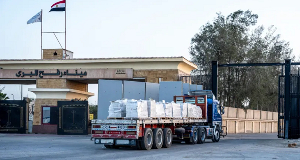It is no longer news to hear countries announcing the number of confirmed cases of the novel Corona Virus Disease (COVID-19) pandemic and Ghana as a country is not exempted from this natural disaster.
The infectious disease has neither “a passport nor visa” but has been able to travel across most borders and territories across the globe causing havoc to every economy including the world superpowers such as the United States of America and China.
It is, however, important to note that one of the areas that most African countries including Ghana are not paying much attention to, is the devastating effects the virus is causing to the agriculture production sector, which is likely to affect food security to rock the African continent.
According to the Food and Agriculture Organization of the United Nations 2020 report on the State of Food Security and Nutrition in the World, the COVID-19 pandemic could push up to 132 million people into hunger by the end of 2020.
To quote excerpts from the report, “as progress in fighting hunger stalls, the COVID-19 pandemic is intensifying the vulnerabilities and inadequacies of global food systems. While it is too late to assess the full impact of the lockdowns and other containment measures, at least, another 83 million people and possibly as many as 132 million, may go hungry in 2020.”
In Ghana to be specific, when President Nana Addo Dankwa Akufo-Addo announced the partial lockdown in some areas of Accra, Tema, Kumasi, and Kasoa, food prices went up and the government had to spend huge sums of money on food to cater for the vulnerable.
Food crisis is a looming pandemic that many countries may not foresee while they are battling to curb the spread of the virus especially developing countries such as Ghana of which if pragmatic measures are not taken to boost agriculture production, food security crisis would be the worst pandemic to hit the country and the world at large.
There is an old adage in Gurune, which says, “if a stone is falling, everybody protects his or her head,” what this simply means is that if there is any looming disaster, individually, one would do whatever it takes to guard himself or herself against it before thinking of saving someone else.
This is what the outbreak and spread of the COVID-19 pandemic has presented to the world and there is no doubt that the new disease living with us would have dire consequences on every sector of the economy including food and nutritional security.
Ghana food imports
It is clear that the agriculture sector is the backbone of Ghana’s economy as about 70 percent of its population is directly or indirectly engaged in farming and depend largely on farm produce for survival.
Despite the huge numbers engaged in agriculture, the country has over the years faced food security and nutritional issues and has been importing some kinds of foods especially grains such as rice, and that was even before the outbreak of the COVID-19 pandemic.
Statistics available from the Ministry of Trade and Industry indicates that Ghana spends more than $1 billion each year to import only rice into the country and in 2017, an amount of $1.1 billion was spent on only rice importation.
According to the Ministry of Finance in 2018, food imports cost the nation an average of US$2.4 billion annually, being importation of rice, sugar, sorghum, frozen chicken, and meat among other food items for domestic and industrial consumption.
Concerns from farmers
Speaking in an interview with the Ghana News Agency in Bolgatanga in the Upper East Region, some farmers expressed the fear that the pandemic would greatly affect agriculture production in the area, especially among the smallholder farmers.
Many of the farmers expressed the fear that as they mainly engage manual labour on their farms, the mode of transmission of the virus and the prescribed measures they had to take to protect themselves would make it difficult for them to engage in the normal farming practices such as engaging communal labour.
To them, the COVID-19 pandemic had drained all their financial resources such that paying for mechanization services as an alternative to the manual services as well as taking care of their families, which was practically difficult.
Reverend John Akaribo, a farmer at Nyariga, a community in the Bolgatanga Municipality said most of the farmers particularly the smallholder farmers depended on the proceeds of previous yields, however, the lockdown did not allow farmers to sell their products.
He said most of the farmers, especially dealers in perishable produce incurred losses as a result of the restrictions on travelling and most people could not afford farm inputs and other agriculture services to undertake production.
Mr Charles Kwowe Nyaaba, Head of Programmes and Advocacy of the Peasant Farmers Association of Ghana (PFAG), explained that apart from the subsistent farming, any other forms of farming would be reduced due to the COVID-19 pandemic.
He said group farming would not be practiced since the money to hire mechanization services would be a challenge.
He explained that most farmers due to the long processes in acquiring credit facilities at the financial institutions, resort to families and friends for support, however, due to the COVID-19, their businesses have been challenged.
“Because of COVID-19, farm implements such as tractors have not been imported to provide mechanization services, you will go to the valleys and you will see several farmers queuing for tractor services, the ones the Ministry brought are not good for the kind of farming we do,” he added.
Government’s efforts to improve food production
Though the government through the Ministry of Food and Agriculture intends to increase the number of farmers benefiting from the flagship programme, Planting for Food and Jobs (PFJs) for this year, more needs to be done to avert any possible food and nutrition crisis.
For instance, Mr Francis Ennor, the Upper East Regional Director of the Department of Agriculture, stated that the government had increased the number of beneficiary farmers under the PFJs to 200,000 from the 130,000 enrolled in 2019.
He said although his outfit has begun implementing strategies through the Savannah Zone Agriculture Production Improvement Productivity (SAPIP) and the Savannah Zone Investment Programme (SIP) to increase commercial production of rice, maize and soybeans, more investment needs to be done to avert any food shortage.
“As a country, we are self-sufficient in maize, cassava, and tubers except for rice. The importation of rice is still very high and we are taking rice production very seriously. If we don’t sit up and do more, it is going to affect food availability in the coming year,” he added.
Recommendations
Statistics has it that, annually, Ghana imports about 70 percent of the rice it needs. It is now clear that without increased domestic production of food particularly rice, which Ghanaians consume more than any other kind of foodstuff, there will be a shortage of it on the market.
It is heartwarming to hear the increase in the number of people benefitting from the PFJs, however, it would be commendable if the government could offer farmers free inputs instead of subsidizing the price, it would alleviate the cost of production and enable the poor farmers to expand their farms.
In order to meet the high demand for food and other agriculture products particularly rice, government needs to invest strategically in large scale rice production, by supporting commercial farmers to expand their farms.
The government last year pledged to make the Fumbisi Rice Valley in the Builsa South District of the Upper East Region, the hub of rice production in West Africa and there is no better time to fulfil this promise than now, by supporting farmers in the area and other valleys across the country to sustainably cultivate rice for local consumption and export.
The government further needs to connect the farmers especially the farmer unions to the financial institutions to ensure that they receive credit at reasonable interest rates to be able to expand their farms.
To ensure the availability of the farm market produces, to encourage farmers to upscale their farming, the government needs to implement policies that would ensure that Ghanaians eat what they grow while other public institutions are compelled to purchase local agricultural products.
It would not be out of place for government to treat agriculture specially and develop coordinated policy and lucrative stimulus packages for farmers, agribusinesses and other people engaged in the agriculture value chain, to increase production.
This would help revive the economy, alleviate smallholder farmers from extreme poverty, and put Ghana back on track to achieving the Sustainable Development Goals (SDGs) as well as prevent any unforeseeable food insecurity.
Opinions of Monday, 24 August 2020
Columnist: Anthony Adongo Apubeo















